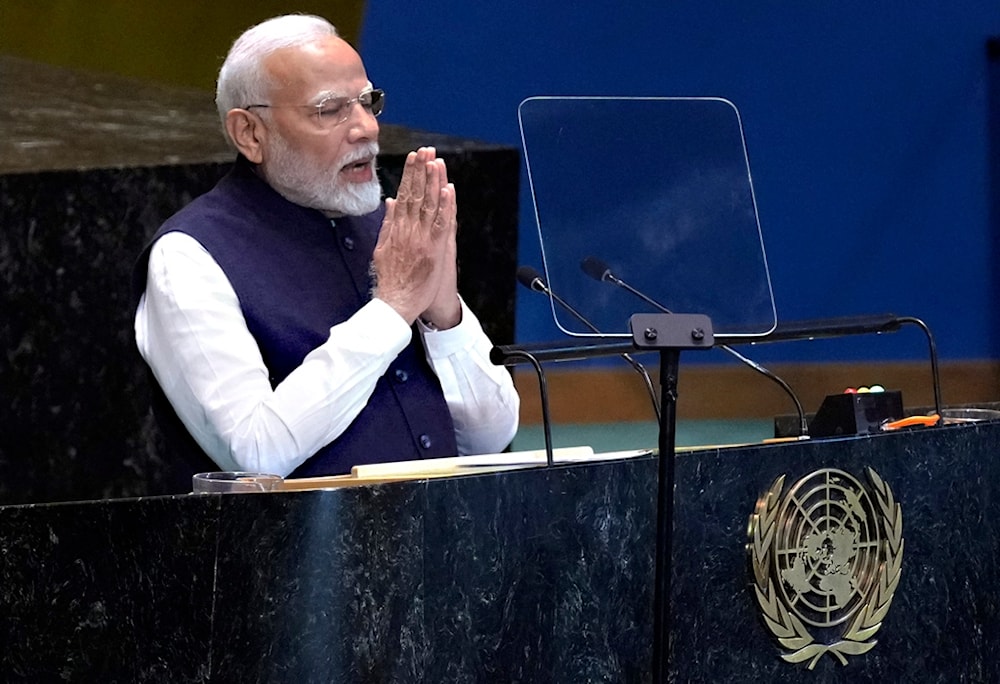Modi calls for peace through 'collective strength, not on battlefield'
India's prime minister advocates for peace during the Summit of the Future in light of global conflicts and rising tensions across Gaza, Ukraine, and Lebanon.
-

India's Prime Minister Narendra Modi addresses the Summit of the Future, in the United Nations General Assembly, Monday, September 23, 2024. (AP)
During the 79th UN General Assembly session in New York on Monday, Indian Prime Minister Narendra Modi called for reforms in international institutions and highlighted the need for peace to ensure global success.
"Success of humanity lies in our collective strength, not on the battlefield. For global peace and development, reforms in global institutions are important. Reform is the key to relevance," Modi said at the Summit of the Future.
His remarks come amid escalating tensions across the globe, including the Israeli genocide in Gaza, the Israeli war on Lebanon, and the Russian-Ukrainian conflict.
Earlier on Sunday, Modi met with Palestinian Authority President Mahmoud Abbas and expressed his profound concerns regarding the deteriorating humanitarian crisis in Gaza, as well as rising tensions in the region.
A statement issued by New Delhi reaffirmed the Prime Minister's continued and "unwavering support to the people of Palestine, including continued humanitarian assistance."
Modi, in turn, called for a ceasefire in the Strip, the release of Israeli captives, and the establishment of diplomatic dialogue and solutions, claiming only the so-called two-state solution would restore and establish "enduring peace and stability in the region." Moreover, India advocated for and supported Palestine's bid for UN membership.
However, it is worth noting that India strongly condemned Operation Al-Aqsa Flood on October 7, claiming it was an "act of terrorism", and repeatedly abstained from voting on UN resolutions related to "Israel" since the war on Gaza began, including last week's vote on ending the occupation of Palestine within a year, in an attempt to balance out its condemnation for the mass killing of Palestinians and its alliance and relations with the Israeli occupation.
India advocates for peace in Russia-Ukraine
During the General Assembly, Modi also held meetings with Vietnamese President To Lam, Armenian Prime Minister Nikol Pashinyan, and Ukraine’s President Volodymyr Zelensky.
In a post on X (formerly Twitter), Modi emphasized India's commitment to achieving an "early resolution of the conflict in Ukraine and restoring peace and stability."
Earlier in August, Modi landed in Ukraine to press for a deal to end the war with Russia during his historic meeting with Ukrainian President Volodymyr Zelensky in Kiev.
Only a few weeks after Ukraine's counteroffensive into Russian territory and two and a half years after Russia's war in Ukraine, Modi is positioning himself as a potential peacemaker.
Before departing, Modi said, “No problem can be resolved on a battlefield,” adding that India supported “dialogue and diplomacy for restoration of peace and stability as soon as possible”.
Modi is the first Indian PM to visit Ukraine in 30 years.
Advisor in the Ukrainian president's office, Mykhailo Podolyak, told Reuters that New Delhi "really has a certain influence" on Moscow, which makes Modi's visit to Kiev noteworthy.
"It's extremely important for us to effectively build relations with such countries, to explain to them what the correct end to the war is - and that it is also in their interests," he added.

 3 Min Read
3 Min Read








